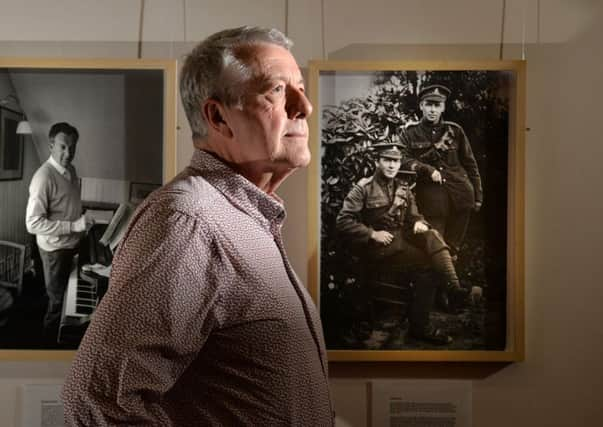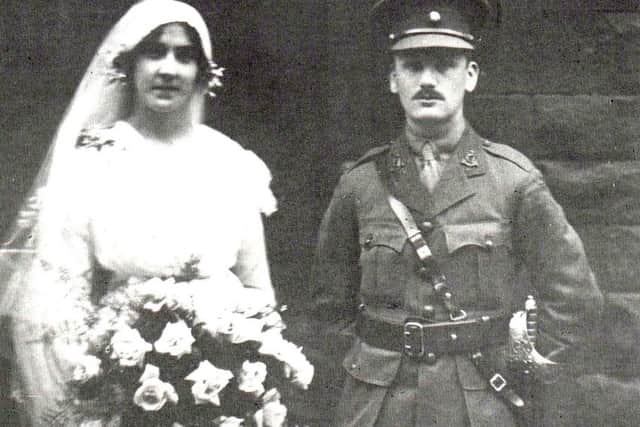Leeds exhibition that is a requiem to the First World War


It was on the back of his book, Stories from the War Hospital, that Richard Wilcocks was approached about putting together an exhibition commemorating the end of the Great War.
His book, published four years ago to coincide with the centenary of the start of the conflict, revolved around the Second Northern General Hospital hospital at Beckett Park, in Headingley, which was used to treat wounded soldiers during the war and at the time was the main war hospital in Leeds. In it he helped unearth stories about some of the nurses, soldiers and doctors who spent time there.
Advertisement
Hide AdAdvertisement
Hide AdNow, Richard, who sings bass with Leeds Festival Chorus, has put together an exhibition of photographs and stories linked to a performance of Benjamin Britten’s emotive War Requiem next month at Leeds Town Hall.


The concert, which commemorates the 1918 Armistice, features Leeds Festival Chorus, alongside the City of Glasgow Chorus and the Cantabile Choir, an array of brilliant soloists and the BBC Philharmonic, with Simon Wright conducting.
The accompanying exhibition – War Requiem – on show at the Broderick Exhibition Space, in Leeds Town Hall, runs until the end of January.
“I asked as many singers as possible to burrow around in their family histories, and used my digital archive from when I was researching my book Stories from the War Hospital in 2014. What I received was personal, intimate and compelling,” says Richard.
Advertisement
Hide AdAdvertisement
Hide Ad“What was given to me was quite surprising. People were apologising because sometimes what they’d found wasn’t about the Western Front and I told them it was fine because this was a world war – it wasn’t just about the Western Front.”
Most of the stories and photographs relate to members of the three choirs taking part in the concert, along with a few from Richard’s book.
Stitched together they offer a snapshot of the lives of ordinary people unwittingly caught up in a war that left an indelible mark on human history.
The exhibition features more than 30 stories some of which, like that of Alice Griffiths, are tantalisingly brief. Alice was the great-great grandmother of Mary Crothers, an alto with Leeds Festival Chorus. “She was not only a midwife before the war but also a suffragette,” says Richard. “She used to go to political meetings and would protest during speeches by politicians opposed to giving women the vote by popping balloons. We know that she went on to work at a war hospital but that’s where the trail stops.”
Advertisement
Hide AdAdvertisement
Hide AdOriginally Richard focused on the stories gathered by members of the Leeds Festival Chorus, but when the Glasgow choir became involved this yielded further material. “No exhibition can possibly be a comprehensive account of the war and this is just a glimpse at a tiny part of that conflict linked to a bunch of people singing today. It concentrates on one group but I think like so many of the First World War exhibitions the stories stand for everyone in a way.”
Among the poignant stories is that of Florence and her husband, Gilbert Petrie, a soldier at the Front, unearthed by her grandson Tim Reilly, a bass singer with the City of Glasgow Choir. He discovered a photo of the couple on their wedding day and a letter Florence wrote to Gilbert.
In it she writes: “Every waking moment I am with you darling & at nights I still gather you up in my arms... I cannot talk of anything else tonight but just you – you are my all-in-all & I really do not think I ever realized until the strain of this last week just what you really mean to me.”
She continues: “Will this wretched business ever be finished Gilbert? But there! I must not complain tonight – I shall sleep with your letter under my pillow & thank God for having kept you safe for me – Baby is a darling – your photo she loves and the glass of it is marked with her little fingers and lips and She will ‘kiss Daddy’ any time. And now goodnight my precious Darling.”
Advertisement
Hide AdAdvertisement
Hide AdIt is, as Richard says, “incredibly emotional”. “She’s talking about their little baby and describes her leaving her fingerprints on his photograph. You read this and it sounds like something that could be happening today, it’s something we can all relate to.”
Gilbert survived the war and came home to his wife. Others weren’t so fortunate.
Helen Whale is a soprano with Leeds Festival Chorus and her great-great-uncles, George Hubbard Reynolds and Frank Leslie Reynolds, from Derbyshire, are featured in the exhibition.
They were both killed in 1916 within a matter of months of one another. George was still qualifying as a schoolmaster when he was commissioned as a 2nd Lieutenant in the Prince of Wales Volunteers. He served at Gallipoli and then took part in the Mesopotamia Campaign, where he was killed in action, aged 22. He is commemorated on the Basra Memorial in Iraq.
Advertisement
Hide AdAdvertisement
Hide AdA report from the Derbyshire Times, from April 22, 1916, stated: The deceased was of a very studious turn of mind, and a brilliant mathematical scholar, on which account he secured a year’s extension at college with a view to the further study of higher mathematics, in which branch of education he had hoped to take up an appointment.”
His brother Leslie was also still qualifying as a schoolmaster when the war started. He, too, was commissioned as a 2nd Lieutenant, this time with the Sherwood Foresters.
Tragically, he was killed during the Battle of the Somme on July 20 and is commemorated on the Thiepval Memorial in France. Another newspaper report recounts what happened: “The company made an attack, and the last officer to see Mr Reynolds says that he was leading the men and shouting ‘Come on Boys!’”
Such accounts are a sombre reminder of the human cost wrought by this harrowing war. “I hope people that visit the exhibition are reminded of how personal the First World War was and that it’s not just a whole load of pages in the history books, or something that you study for an exam. It’s a reminder that it affected everyone,” says Richard.
Advertisement
Hide AdAdvertisement
Hide Ad“We can all find a relative somewhere along the line who was involved in some way. It was like a pall over the country and the effects of that time are still with us and it’s right that we know what happened and remember those who were caught up in it all.”
Benjamin Britten’s War Requiem takes place on November 17, at 7.30pm at Leeds Town Hall. Tickets from £17.50 to £36. Call 0113 376 0318 [email protected]
The War Requiem Exhibition at the Broderick Exhibition Space, Leeds Town Hall, runs until January 31 next year.
War Requiem was first composed by Benjamin Britten as a commission for the rededication of Coventry Cathedral, which was badly damaged during the Second World War, in 1962.
Advertisement
Hide AdAdvertisement
Hide AdThe work has remained popular and remains one of the composer’s most performed pieces over the years.
Britten, a pacifist, was deeply moved by the poetry of Wilfred Owen, who was killed in French just weeks before the war ended in November 1918.
He wrote a quotation from Owen on the title page of his score – “My subject is War, and the pity of War. The Poetry is in the pity” – and interspersed nine of Owen’s poems amongst the Latin words of the Requiem.